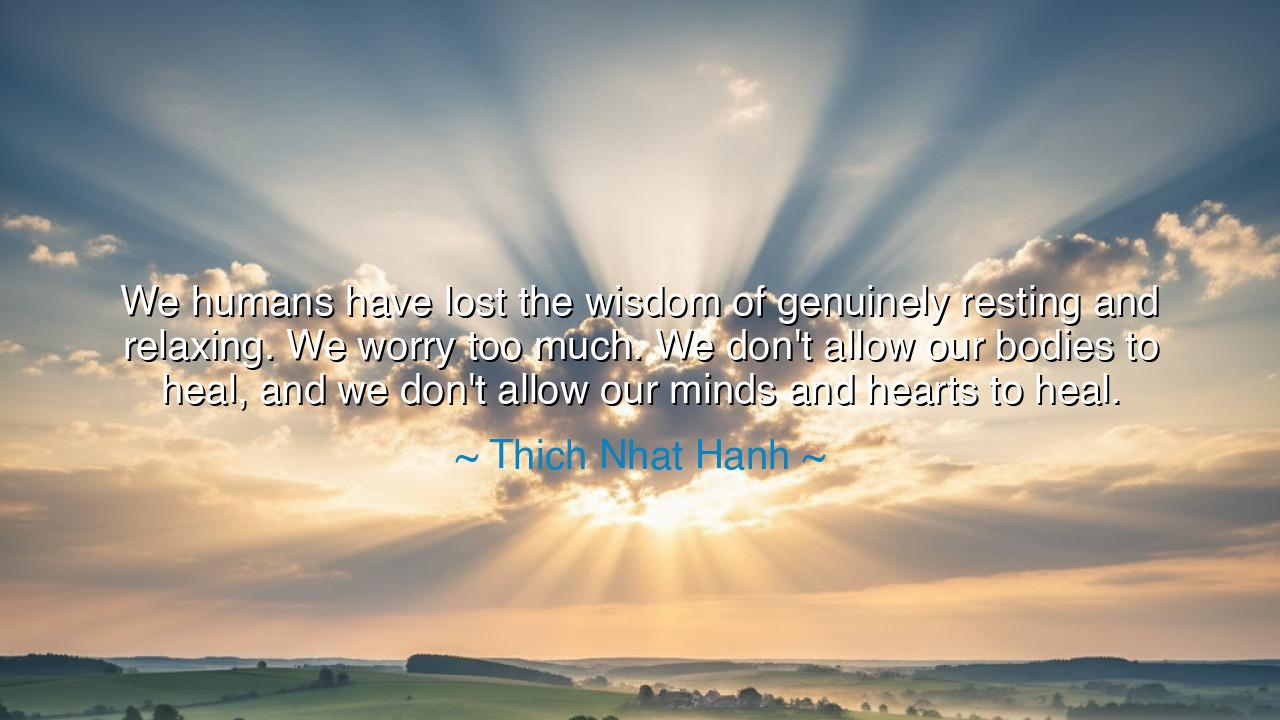
We humans have lost the wisdom of genuinely resting and
We humans have lost the wisdom of genuinely resting and relaxing. We worry too much. We don't allow our bodies to heal, and we don't allow our minds and hearts to heal.






Hearken, O children of the ages, to the gentle yet powerful words of Thich Nhat Hanh, the master of mindfulness and peace. He laments that we humans have lost the wisdom of genuinely resting and relaxing. In our ceaseless striving, we have become prisoners of worry, racing through life without pause. By doing so, we deny our bodies, our minds, and our hearts the sacred gift of healing. True rest, he teaches, is not idleness but a profound practice of renewal, a return to harmony with ourselves and the world.
Hanh reminds us that worry is a poison that corrodes the spirit. When we cling to our fears and anxieties, our bodies remain tense, our thoughts restless, and our hearts burdened. Just as a field must lie fallow to regain its fertility, so too must we allow our inner being to heal. Without rest, we deplete our life force and lose the clarity to see truth. This is why rest is not weakness, but a form of deep strength and wisdom.
Consider the ancient story of Emperor Ashoka, who waged terrible wars to expand his kingdom. After witnessing the immense suffering his battles had caused, Ashoka turned to the teachings of the Buddha and embraced peace. Through meditation and stillness, he found healing and clarity, transforming from a ruthless conqueror into a compassionate ruler. His life shows how stillness and reflection can heal not only an individual, but an entire realm.
In our modern age, many live as Ashoka did before his awakening: endlessly striving, endlessly worrying. The worker who never pauses, the parent burdened by constant care, the leader consumed by decisions—all suffer because they have forgotten how to simply rest and relax. Yet, in moments of silence and mindfulness, healing begins. The body eases, the mind clears, and the heart remembers its natural rhythm of joy.
O children of the future, carry this teaching in your hearts: reclaim the wisdom of rest. Let go of worry, if only for a moment. Breathe deeply, walk slowly, sit quietly. In these simple acts, the soul begins to heal, and strength is renewed. Remember that a life without stillness is like a garden untended—it withers and fades. But with rest and care, it blossoms into beauty once more.
Thus, the words of Thich Nhat Hanh echo through the ages, a gentle call to awaken: to slow down, to heal, and to live not in fear, but in harmony. In rest lies not laziness, but the foundation of peace, compassion, and enduring vitality.






LGLuong Giap
Thich Nhat Hanh’s words make me reflect on the rhythm of life we often ignore. I feel intrigued by the idea that rest is not laziness but a form of wisdom. I wonder how societies that prioritize speed and output can learn to honor rest as essential. Is it possible that reconnecting with the body’s and mind’s natural healing cycles could improve overall well-being, creativity, and emotional resilience in ways we currently underestimate?
NHNguyen Hoa
I find this statement profoundly relevant to the modern human condition. It raises questions about how stress and worry accumulate silently, affecting both body and mind. I wonder if this neglect of genuine relaxation contributes to chronic illnesses, burnout, or emotional disconnection. How can individuals integrate practices that allow true healing without feeling guilty for ‘not doing enough’? Could meditation, slow living, or mindful breathing be the tools to recover this wisdom?
NTHa Nam Tran
This quote prompts me to think about the cultural pressures that equate busyness with success. I feel concerned that many people equate productivity with self-worth, neglecting the healing power of rest. How might we shift societal values to honor stillness and reflection as essential rather than indulgent? I’d like to explore whether education or workplace policies could encourage more holistic approaches to health, mental clarity, and emotional well-being.
TANguyen Thi Thuy An
Reading this, I feel both challenged and reflective. It makes me wonder how much of modern life is dominated by constant activity and mental overload. Are we truly neglecting the body’s and mind’s need for rest, or is it just that we don’t recognize it? I’m curious about practical ways to reclaim this lost wisdom of genuine relaxation. Could mindfulness, structured downtime, or digital detoxes help restore balance in our daily lives?